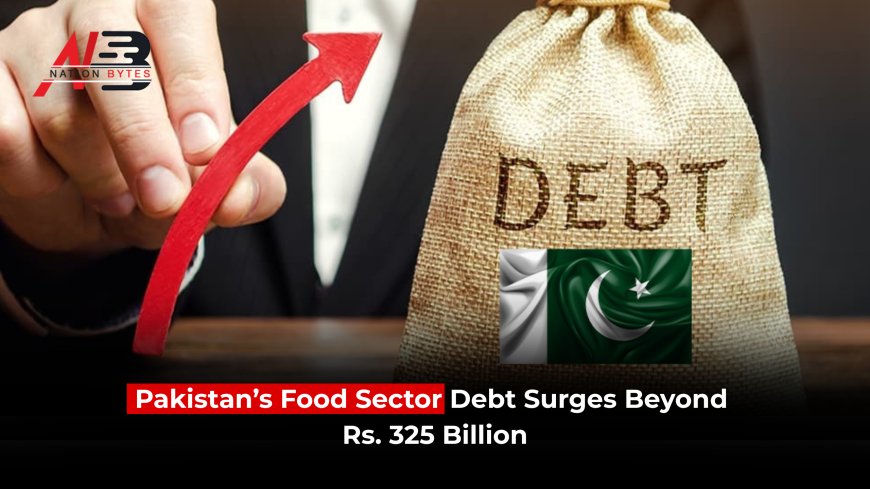Pakistan’s Food Sector Debt Surges Beyond Rs. 325 Billion
Pakistan’s food sector debt hits Rs. 325 billion as interest piles up; NFML, USC top defaulters amid rising fiscal and food security concerns.

Pakistan’s food sector is facing a deepening financial crisis as its circular debt has surged beyond Rs. 325 billion, according to official documents from the Trading Corporation of Pakistan (TCP). The alarming rise highlights long-standing issues of delayed recoveries, mismanagement, and compounding interest that now threaten the country’s food security and fiscal stability.
Breakdown of the Debt Structure
As of September 30, 2025, the total circular debt of the food sector stands at Rs. 325.6 billion, with a staggering Rs. 237.3 billion (73%) attributed to accumulated markup alone. The remaining Rs. 88.3 billion comprises the principal amount.
This data exposes how delayed payments and poor financial discipline have inflated the sector’s debt burden over the years. Experts warn that such a high proportion of interest-based liabilities indicates a structural flaw in the government’s financial management system, where outstanding dues keep multiplying due to inaction.
Top Defaulters: NFML and USC Lead the List
The National Fertilizer Marketing Limited (NFML) has emerged as the largest defaulter, owing Rs. 126.8 billion. Close behind is the Utility Stores Corporation (USC), with a debt of Rs. 110 billion.
Both entities operate under federal government control, raising serious concerns about weak oversight and inefficient fiscal governance. Officials describe this as a case of “persistent financial indiscipline,” where state-run enterprises continue to accumulate unpaid dues without accountability or reform.
Provincial and Institutional Liabilities
Among provincial governments, Punjab tops the list with Rs. 17.6 billion in unpaid dues, followed by Khyber Pakhtunkhwa at Rs. 13.2 billion, Sindh with Rs. 9.6 billion, and Balochistan at Rs. 9.5 billion. Meanwhile, Gilgit-Baltistan and Azad Jammu and Kashmir (AJK) collectively owe around Rs. 9 billion.
Other key defaulters include:
-
Pakistan Navy: Rs. 231 million
-
Directorate General Procurement (Army): Rs. 1.7 billion
-
PASSCO (Pakistan Agricultural Storage and Services Corporation): Rs. 6.1 billion
-
Ministry of Food Security and Ministry of Industries: Over Rs. 21 billion combined
These figures illustrate that both federal and provincial institutions are part of a broader financial gridlock, reflecting deep-rooted inefficiencies in fund management and accountability mechanisms.
Debt Pattern Mirrors Energy Sector Crisis
The TCP report warns that the food sector’s debt pattern is beginning to resemble Pakistan’s energy sector circular debt, which has already crossed Rs. 2.3 trillion. The same cycle of delayed payments, compounding markup, and weak financial controls now threatens to destabilize the food sector as well.
Experts note that if this pattern continues unchecked, Pakistan could face a liquidity crunch in the food supply chain, resulting in payment defaults, supply disruptions, and increased food prices nationwide.
Impact on Food Security and Market Stability
The growing debt burden poses serious risks to Pakistan’s food security. With mounting dues and reduced liquidity, state-run enterprises like TCP, NFML, and USC may struggle to procure essential commodities such as wheat, sugar, and fertilizer.
Economists warn that this could lead to shortages, price spikes, and import dependencies, further pressuring the country’s already fragile economy. Private suppliers may also hesitate to engage with government entities due to delayed payments, worsening the situation.
Government Response and Possible Reforms
In response to the crisis, officials within the Ministry of Finance and Ministry of Food Security have called for immediate financial restructuring and strict recovery mechanisms. There are also discussions underway to digitize payment systems, introduce performance audits, and enforce penalties for delayed recoveries.
According to one senior TCP official, “Without accountability and automation, this cycle will never break. The government must ensure that both federal and provincial entities clear their dues within fixed timelines.”
Economic Experts Urge Accountability
Economists emphasize that the government must prioritize debt restructuring and institutional transparency to prevent the food sector from slipping into a full-blown financial collapse. They suggest that interest-free repayment plans, audited recoveries, and budget reallocations could help reduce the debt burden.
Additionally, experts urge the government to create a centralized monitoring system under the Ministry of Finance to oversee payments and debt accumulation across all departments.
A Call for Fiscal Discipline
The rising food sector debt underscores the urgent need for fiscal discipline across public institutions. Without timely payments and improved governance, the financial burden could spill over into other sectors much like what has happened with power and gas debts.
If left unchecked, the Rs. 325 billion food sector liability could not only destabilize government finances but also threaten market confidence, supply continuity, and citizen welfare.
For more updates visit: Nation bytes

 Ateeq Ur Rehman
Ateeq Ur Rehman